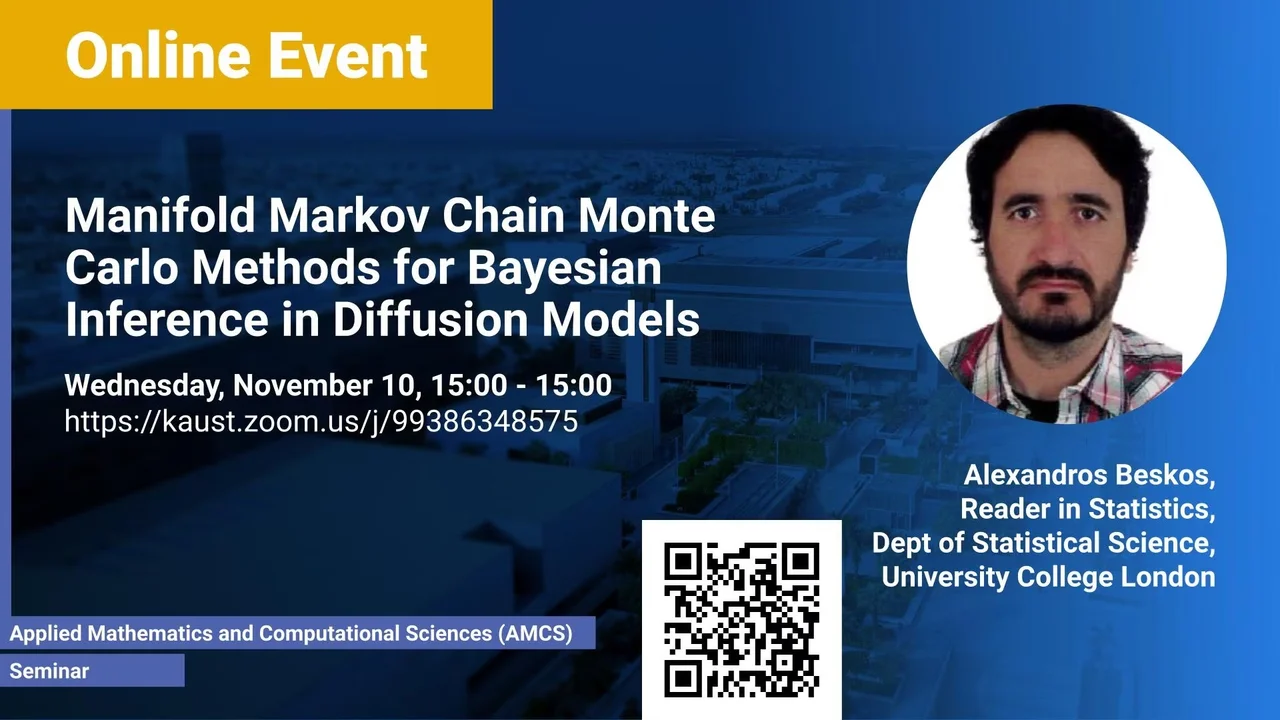
Manifold Markov Chain Monte Carlo Methods for Bayesian Inference In Diffusion Models
- Prof. Alexandros Beskos, the Dept of Statistical Science, University College London (UCL)
KAUST
Bayesian inference for nonlinear diffusions, observed at discrete times,is a challenging task that has prompted the development of a number of algorithms, mainly within the computational statistics community. We propose a new direction, and accompanying methodology - borrowing ideas from statistical physics and computational chemistry - for inferring the posterior distribution of latent diffusion paths and model parameters, given observations of the process
Overview
Abstract
Bayesian inference for nonlinear diffusions, observed at discrete times,is a challenging task that has prompted the development of a number of algorithms, mainly within the computational statistics community. We propose a new direction, and accompanying methodology - borrowing ideas from statistical physics and computational chemistry - for inferring the posterior distribution of latent diffusion paths and model parameters, given observations of the process. Joint configurations of the underlying process noise and of parameters, mapping onto diffusion paths consistent with observations, form an implicitly defined manifold. Then, by making use of a constrained Hamiltonian Monte Carlo algorithm on the embedded manifold, we are able to perform computationally efficient inference for a class of discretely observed diffusion models. Critically, in contrast with other approaches proposed in the literature, our methodology is highly automated, requiring minimal user intervention and applying alike in a range of settings, including: elliptic or hypo-elliptic systems; observations with or without noise; linear or non-linear observation operators. Exploiting Markovianity, we propose a variant of the method with complexity that scales linearly in the resolution of path discretisation and the number of observation times. Example Python code is given at git.io/m-mcmc.
Brief Biography
Alexandros Beskos is a Reader in Statistics at the Dept of Statistical Science, University College London (UCL). Mathematics at Imperial College London. His main research interests lie in the area of Applied Probability and Statistics and, more specifically, in the fields of Computational Statistics and Monte-Carlo methods. In brief, he has worked on the Theoretical Aspects, Methodology and Applications of computational Monte-Carlo algorithms (Markov chain Monte-Carlo and Sequential Monte-Carlo). Such methods are of great significance for the calibration of Complex Stochastic Models used in applications across an ever-increasing range of disciplines, including Engineering, Finance, Biology, Atmospheric Sciences, Econometrics, Social Sciences. The area designated above can involve extremely varying research challenges, requiring expertise in: Computations (e.g., Parallelisation, Cloud Computing, 4D-Var, Particle Filtering, Markov chain Monte Carlo, Multilevel Monte-Carlo), Probability (Asymptotic Analysis, Advanced Theory on Stochastic Processes, Random Matrices, Fractional Noise), Applied Mathematics (Numerical Analysis, Partial Differential Methods, Fluid Dynamics, Hamiltonian Equations, Manifold Theory, Chaotic Systems, Hilbert Spaces, Inverse Problems, Data Assimilation), Statistics & Data Science (Modelling of Complex Systems across a whole spectrum of disciplines, Advanced Calibration Methods, Variational Inference, Machine Learning). He has published or submitted 46 papers, at top Statistics, Probability, Applied Mathematics journals. According to Google Scholar, he has an i10-index of 28, and his works have received approximately 3,000 citations.
Dr Beskos obtained his PhD in 2005, at the Dept of Mathematics and Statistics, Lancaster University, under the supervision of Prof Gareth Roberts. He then held a Post-Doctoral Fellowship position, at the Dept of Mathematics and the Dept of Statistics, at University of Warwick, during 2005-08. In 2008, he was appointed as a Lecturer in Statistics at the Dept of Statistical Science, University College London. He was promoted to Senior Lecturer in Statistics in 2012. He was an Associate Professor at the Dept of Statistics and Applied Probability, National University of Singapore, in 2013-14. He returned at UCL and was promoted to Reader in Statistics in 2015. At his Dept at UCL, Dr Beskos has led the Research Theme of Stochastic Modelling of Complex Systems.
Dr Beskos has been a Research Fellow at the Alan Turing Institute in London since 2017. He was a Visiting Researcher at the Signal Processing Group, Engineering Dept, University of Cambridge, during 2014-15. He was a Visiting Associate Professor at Yale-NUS College, Singapore, during a period of Sabbatical in 2020-21.
Alexandros received the Leverhulme Trust Prize in 2014, one of five awarded in the UK, in the general theme of Mathematics and Statistics. He has been funded by two EPSRC grants (one as PI, one as a co-I), and has been a co-I in a Grant awarded by the Alan Turing Institute.